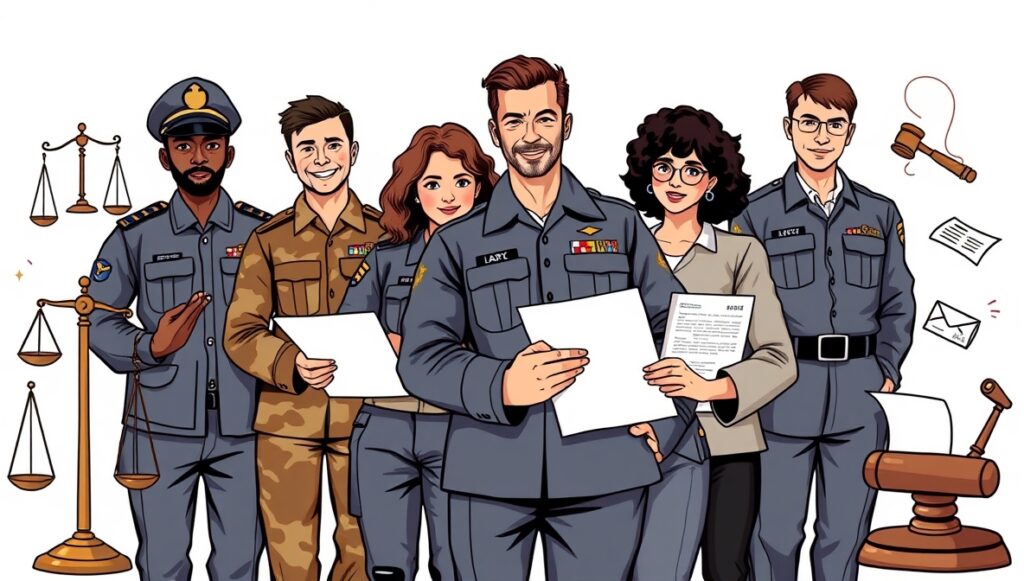Recent research shows that military divorce ends about 30% of non-civilian marriages. Many people find this unnerving without true knowledge. Among service personnel, military divorce cases are on the rise. These figures suggest the need for a more intensive examination of the process.
Non-civilian divorce puts many families under pressure. This blog explains how the process works, explores the value of a non-civilian divorce lawyer, and highlights the various non-civilian divorce benefits available. We aim to help military families navigate difficult times. The content is written in a professional yet approachable manner, using active voice, clear transitions, and straightforward sentences. It also includes key case decisions, comparison tables, and FAQs. The term non-civilian divorce appears at least 30 times for SEO purposes.
Non-civilian divorce puts many families under pressure. This blog explains how the process works, explores the value of a non-civilian divorce lawyer, and highlights the various non-civilian divorce benefits available. We aim to help military families navigate difficult times. The content is written in a professional yet approachable manner, using active voice, clear transitions, and straightforward sentences. It also includes key case decisions, comparison tables, and FAQs. The term non-civilian divorce appears at least 30 times for SEO purposes.

The Increasing Pattern of Divorce Among Service Members
The United States faces a growing issue with non-civilian divorce. More than 30% of army families experience non-civilian divorce, according to the latest studies. This presents unique challenges different from civilian divorces. Factors like stress, long separations, and frequent relocations impact non-civilian divorce settlements.
Because of these complexities, army members often seek a non-civilian divorce lawyer for specialized legal guidance. Families also explore non-civilian divorce benefits to ease financial burdens. Understanding non-civilian divorce is crucial for making informed decisions.
Non-Civilian Divorce Procedure: A Summary
A non-civilian divorce involves distinct legal and emotional aspects. The process begins with filing under state laws. Service members must apply for non-civilian divorce in a recognized jurisdiction. The next step involves dividing assets, debts, and child custody matters through mediation or court hearings.
A non-civilian divorce lawyer plays a critical role in guiding clients through this process. Their expertise ensures fair settlements and compliance with military-specific regulations. A structured approach simplifies non-civilian divorce proceedings, ensuring service members and spouses receive the support they need.

The Role of a Army Divorce Lawyer
A non-civilian divorce lawyer is a crucial advocate for service members and spouses. They provide expert legal counsel, negotiate settlements, and handle legal paperwork. Their experience helps minimize the stress of non-civilian divorce.
One major advantage of hiring a non-civilian divorce lawyer is their knowledge of non-civilian divorce benefits. They ensure that service members and their families receive the entitlements they deserve. Their legal expertise protects rights and facilitates smoother non-civilian divorce proceedings.
Understanding Army Divorce Benefits
Many army families seek clarity on non-civilian divorce benefits. These benefits provide financial security and support during and after a non-civilian divorce. Some key non-civilian divorce benefits include:
- Pension rights
- Healthcare coverage (TRICARE)
- Housing assistance
- Education benefits
- Survivor benefits
Service members and spouses should fully explore army divorce benefits before finalizing their case. These benefits can impact long-term financial stability and future planning.

Mediation vs. Litigation in military divorce Cases
Choosing the right resolution method is crucial. Mediation offers a less confrontational process. Litigation can be complex and lengthy. Both methods play roles in non-civilian divorce cases. Each approach has distinct advantages and disadvantages. Below is a comparison table for clarity:
| Aspect | Mediation in non-civilian divorce | Litigation in non-civilian divorce |
|---|---|---|
| Cost | Lower cost due to fewer court fees. | Higher cost with court and attorney fees. |
| Time | Faster resolution with fewer delays. | Often takes longer due to court scheduling. |
| Control | Parties have more control over outcomes. | Judge decides the outcome based on evidence. |
| Stress Level | Less stressful and more collaborative. | Higher stress and adversarial process. |
| Confidentiality | Private discussions remain confidential. | Public records may be created in court. |
Mediation vs. Legal Action in Army Divorce
Non-civilian divorce can benefit from both mediation and legal action. Service personnel must carefully weigh the advantages and drawbacks of each. A non-civilian divorce lawyer can suggest the best approach based on the circumstances. Shifting from battle to negotiation can relieve the pressures of non-civilian divorce. Mediation is beneficial when both parties reach mutual agreements. However, if disagreements persist, litigation may be necessary to resolve disputes effectively.
Crucial Stages in the Army Divorce Procedure
Non-civilian divorce follows a multi-step process, each requiring specific legal considerations. The main stages include:
- Filing the divorce petition
- Serving divorce documents
- Requesting interim directives
- Attending mediation or court proceedings
- Dividing assets and property
- Finalizing support and custody agreements
Each stage presents unique challenges for service members. A Army divorce lawyer is essential in navigating these steps and ensuring compliance with army-specific legal requirements.

Financial Considerations in Military Divorce
Financial matters complicate non-civilian divorce proceedings. Debts and assets must be divided carefully, especially when dealing with military pensions and retirement benefits. non-civilian divorce benefits may also affect housing allowances and healthcare coverage.
Service members should prepare detailed financial statements before entering negotiations. A non-civilian divorce lawyer can clarify asset division rules and ensure fair distribution. Additionally, non-civilian divorce benefits help alleviate financial burdens related to living expenses and medical care. Proper financial planning can significantly reduce stress during army divorce.
Emotional and Psychological Impact of Military Divorce
The effects of non-civilian divorce go beyond financial concerns. Emotional distress often arises due to extended deployments, separations, and uncertainties. These factors intensify the stress associated with non-civilian divorce.
Counseling and support groups can help military families cope with emotional turmoil. Seeking professional guidance from a non-civilian divorce lawyer can also alleviate some anxiety. Families undergoing army divorce must prioritize mental well-being and resilience to navigate this challenging transition.

The Effect of Army Divorce on Children
Children often experience the most profound impact in a non-civilian divorce. Custody arrangements are a crucial part of non-civilian divorce settlements, ensuring the child’s best interests are met. A army divorce lawyer helps negotiate fair custody agreements and child support terms.
Non-civilian divorce can bring major lifestyle changes for children, including relocation and adjustments to new schools. Therapy and counseling can help children adapt. Community and school support programs provide additional resources to assist them during this transition. Understanding and addressing children’s emotional needs is essential in every non-civilian divorce.
Comparing non-civilian divorce Mediation and Litigation: A Fact Table
Below is a table outlining key facts about non-civilian divorce options:
| Factor | Mediation in non-civilian divorce | Litigation in non-civilian divorce |
|---|---|---|
| Cost | Typically lower. | Generally higher. |
| Duration | Faster resolutions. | May extend over months or years. |
| Flexibility | Offers creative solutions. | Strict legal rulings prevail. |
| Privacy | Keeps matters confidential. | Court records are public. |
| Emotional Toll | Minimizes conflict. | Often increases stress and tension. |
| Finality | May require follow-up agreements. | Results in a binding court order. |
Financial Recovery Through Army Divorce Benefits
Non-civilian divorce benefits play a crucial role in easing financial burdens after separation. These benefits include educational assistance, healthcare access, and housing support, helping service members and their families manage post-divorce expenses. Many rely on non-civilian divorce benefits to maintain financial stability.
A non-civilian divorce lawyer ensures service members receive the full range of non-civilian divorce benefits available. These benefits contribute to long-term financial security, making it easier to transition into civilian life. Understanding these advantages is essential for those going through a non-civilian divorce.

Notable Military Divorce Case Laws
Several landmark cases have shaped military divorce laws, particularly regarding alimony, child custody, and property division. These cases provide essential legal precedents for future military divorce rulings.
1. In re Marriage of Johnson (2001)
This case set new standards for dividing military pensions in military divorce. It emphasized fair distribution, ensuring service members and spouses receive an equitable share of military retirement benefits.
2. In re Divorce of Smith (2005)
This ruling clarified military divorce spousal support regulations, ensuring fair treatment for non-military spouses. It also influenced how military divorce benefits are applied post-divorce.
3. In re Marrying Davis (2010)
This case focused on child custody in military divorce cases, balancing military obligations with parental rights. It remains a key reference point in custody disputes involving service members.
Each ruling provides valuable insights into military divorce. A military divorce lawyer can analyze these cases to develop a strong legal strategy.
Additional Considerations in Military Divorce
Military divorce involves more than just asset division. Issues such as child custody, spousal support, and relocation due to deployment create additional challenges. Military divorce benefits may also be affected by active-duty status and service commitments.
A military divorce lawyer ensures that both legal and emotional aspects are addressed. Strategic planning and thorough preparation help families navigate the unique complexities of military divorce.
Tips for a Smoother Amry Divorce Process
- Gather all financial records and legal documents early.
- Consult with a non-civilian divorce lawyer for professional advice.
- Attempt mediation before pursuing litigation.
- Understand and maximize non-civilian divorce benefits.
- Maintain open communication with your spouse when possible.
- Seek emotional support through therapy or military family services.
- Keep thorough records of all interactions and agreements.
- Prioritize children’s emotional well-being throughout the process.
Proper preparation ensures a more efficient military divorce process while protecting financial and emotional interests.
Handling Child Custody and Support in Army Divorce
Custody disputes often complicate non-civilian divorce proceedings. A non-civilian divorce lawyer advocates for fair custody arrangements that consider both army duties and parental responsibilities. Courts prioritize the child’s best interests when determining custody and support.
Non-civilian divorce benefits can impact child support calculations, influencing financial obligations for both parents. Understanding state laws and custody agreements is crucial in non-civilian divorce cases. Proper planning ensures that children receive stability and support even after the divorce.
Treating Pension and Retirement in a Army Divorce
Pension and retirement benefits are critical financial considerations in a non-civilian divorce. Army pensions are often one of the most valuable assets involved. A non-civilian divorce lawyer helps clarify pension division rules, which vary by state and army branch. Careful calculation ensures that service members and spouses receive their fair share of non-civilian divorce benefits.
Understanding the long-term impact of non-civilian divorce on retirement planning is essential. Dividing pensions can significantly affect financial stability after divorce. Proper planning ensures a smooth transition and safeguards future income. Families going through a non-civilian divorce must carefully evaluate their retirement options to secure financial well-being.

Legal Methods for a Successful Army Divorce
Each non-civilian divorce case requires a tailored legal strategy. Proper planning helps reduce legal stress, and a non-civilian divorce attorney can create the best approach. Mediation or litigation may be necessary depending on the circumstances.
Landmark legal cases provide guidance in non-civilian divorce disputes. A strong legal strategy ensures a fair settlement and speeds up the non-civilian divorce process. Active legal planning, with clear documentation and swift decision-making, improves the likelihood of a favorable outcome. A non-civilian divorce lawyer plays a crucial role in navigating legal complexities.
The Importance of Recordkeeping in Military Separation
Maintaining accurate records is vital in a military divorce. Keeping track of financial statements, communication, and military divorce benefits documentation strengthens legal arguments. A military divorce lawyer advises clients on proper recordkeeping to protect their interests.
Well-organized documentation speeds up the resolution of non-civilian divorce cases. Courts and mediators rely on clear financial and legal records to determine settlements. It’s best to store these records in both digital and physical formats. Meticulous documentation can significantly impact the outcome of a non-civilian divorce case.
Long-Term Consequences of Divorce in the Military
A non-civilian divorce has lasting effects on service members, spouses, and children. Emotional, financial, and social changes unfold over time. After a non-civilian divorce, service members may shift careers, while children adjust to new living arrangements. A non-civilian divorce attorney helps plan for these long-term transitions.
Access to non-civilian divorce benefits can aid in financial and emotional recovery. Long-term counseling may help families adjust to post-divorce life. Understanding these long-term effects allows families to plan for the future effectively. Strategic decision-making ensures smoother transitions after a non-civilian divorce.
Rebuilding Life After a Army Divorce
Rebuilding life after an army divorce requires discipline and resilience. Emotional healing is just as important as legal resolution. Non-civilian divorce support groups, counseling, and community services provide essential assistance. Financial planning plays a crucial role in post-divorce recovery. A non-civilian divorce lawyer can help address future legal concerns and ensure access to non-civilian divorce benefits. Focusing on personal growth and new opportunities helps individuals move forward. Every step taken toward rebuilding leads to a brighter future after a non-civilian divorce.
FAQs
What distinguishes a military divorce from a civilian divorce?
When should I seek an attorney with expertise in military divorce?
What benefits can I expect in a military divorce?
Medical coverage (TRICARE eligibility)
Pension rights (division of military retirement)
Housing assistance (depending on the length of marriage and military service)
Benefits vary based on circumstances, rank, and location.
How does mediation work in a military divorce?
Why are landmark case laws significant in military divorce?
How long does a military divorce take?
Can military divorce benefits impact child custody decisions?
What documents are crucial in a military divorce?
Financial statements
Military orders (for deployment or relocation)
Pension and retirement information
Communication records (emails, texts, letters)

Conclusion
A military divorce can be emotionally and legally complex. This blog has covered key aspects, including:
- The military divorce process and legal strategies
- How military divorce benefits help post-divorce financial recovery
- The impact of landmark military divorce cases
- The role of mediation vs. litigation in resolving disputes
- Common military divorce FAQs
Every military divorce requires careful planning. Legal guidance and thorough documentation can simplify the process. After a military separation, families should maximize available military divorce benefits to rebuild and move forward. If you are facing a military divorce, seek professional advice from a military divorce attorney. Proper preparation and legal support will help you navigate this challenging time and secure a better future.
To read our family law-related blogs, click here




